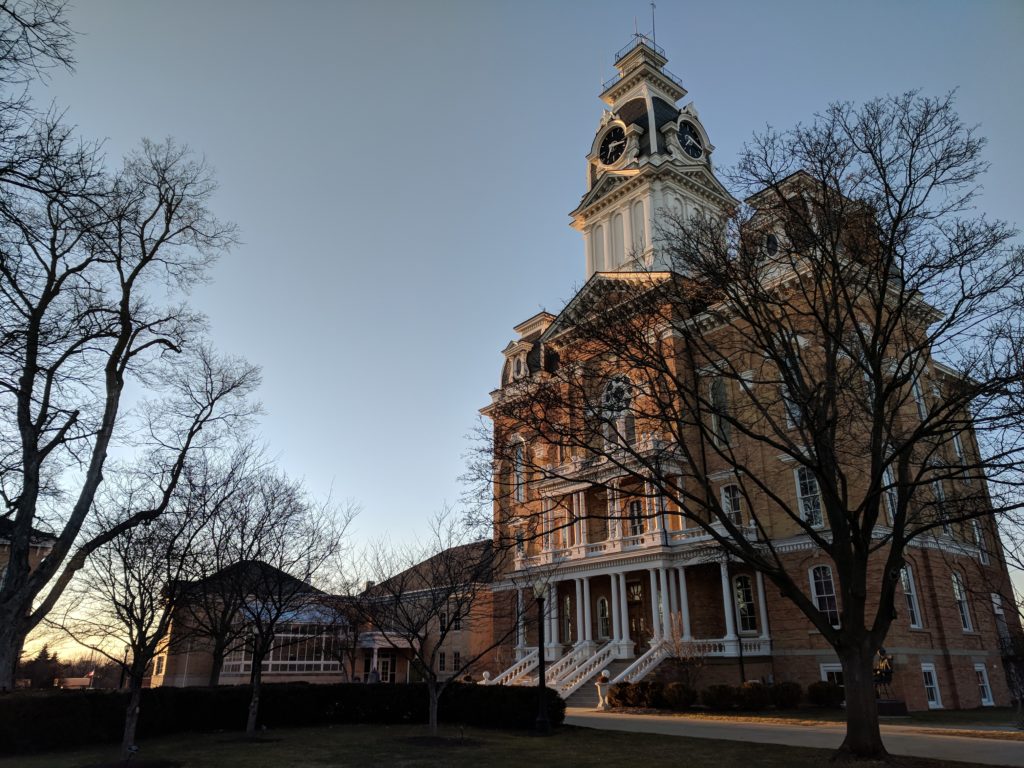
Conservative talk radio hosts praise it on the airwaves. Fox News broadcasts its commercials. The Princeton Review ranks it second in the nation for “Most Conservative Students.” Its Washington, D.C. campus, which houses the newly-opened Graduate School of Statesmanship, sits steps from the capitol. With its emphasis on politics, government, and current events, it would be tempting to sum Hillsdale College up as simply a bootcamp for future presidents.
As a prospective student, that was Taryn Murphy’s impression of the school. Murphy, a junior, grew up in a politically-active family and was involved in politics throughout middle and high school. She planned to study politics in college and Hillsdale seemed like the logical choice.
“I thought Hillsdale was a politics school,” Murphy said. “The way Hillsdale markets itself — or at least how I perceived it — is that it’s a school that is very involved in the political realm, which is true. But when people would ask me about Hillsdale, I would always describe it as a conservative school, not a liberal arts school. I thought of it as a place where we study things with the ultimate aim of going into the political world.”
Upon arriving to campus, however, Murphy discovered that Hillsdale had much more than just its politics department. Today, Murphy is a philosophy and religion major.
Murphy’s experience isn’t an anomaly. According to Brandan Hadlock, director of operations for admissions, 209 people from 2017-2019 expressed interest in either the politics or political economy major as incoming students. But the number of students who ultimately complete the politics program is far smaller. This spring, a mere 27 students in the class of 2019 graduated with a degree in politics. In fact, politics doesn’t even rank among Hillsdale’s most popular majors; that honor goes to history, biology, business, English, and economics.
Junior Paul Esposito has a similar story. Esposito said he arrived at Hillsdale “dead-set” on a Bachelor of Arts in politics.
“I came in thinking that politics was the only field Hillsdale cared for,” he recalled. “I knew that other majors existed here, but I thought that those departments were basically just sideshows to the politics department.”
Within a semester, he switched to a Bachelor of Science in psychology.
“There’s a huge variety of intellectual fields and traditions here that coexist and create an environment that values knowledge in any study,” Esposito said. “Political life is surely a part of Hillsdale, but it’s by no means the only thing here.”
Julia Powell, a junior biochemistry major who once planned to pursue politics, echoed Esposito’s observation.
“I think when you come to understand what Hillsdale actually is and actually stands for, it’s so much more than what their advertisements show it to be,” she explained. “It’s not just, ‘We’re here to conserve traditional American values.’ No, we’re here to conserve an entire Western tradition and all of the books and the authors and the people who are behind it and recognize that there’s value to what they said. That’s the conservative tradition that we’re a part of, not necessarily the political side of things.”
Senior John Ball, a politics-turned-history major, said he was initially surprised by how nonpolitical Hillsdale is.
“There are the Student Federation people and the politics majors, but other than that, people don’t really talk about politics very much,” Ball said. “I think that’s really funny because when I was applying I thought, ‘Oh my gosh, all they’re talking about is politics.’ It’s a very different feeling once you get on campus than the image the admissions videos, counselors, and student ambassadors portray it as.”
But rather than being disappointed by this discovery, Ball said Hillsdale’s academic diversity was a “pleasant surprise.”
“There are incredible history and theology and philosophy classes that you don’t hear about as much as you do constitution,” Ball said. “I found myself enjoying all my other classes more than constitution and politics.”
Powell agreed, noting that the core curriculum was a driving force in her decision to switch her major.
“The core let me see a lot of the other options that were out there,” Powell said. “It wasn’t that I hated the Constitution or the class or the professor. It was just that I started to realize that my interests lay outside the political realm. These are the courses I enjoy and what I actually like has nothing to do with politics.”
While all four students are grateful to have found their niche at Hillsdale, some express concern that the school sells itself short by focusing on only one aspect.
“There’s so much more for you here than just jump-starting a political career,” Ball said. “Hillsdale has so many fantastic departments besides politics, but you don’t hear them talk about it very much. I’ve taken some incredible classes that have nothing to do with politics. You could just as easily paint a picture of Hillsdale as a very arts-heavy, humanities-heavy, religion-heavy school as you can make it out as a politics school.”
Murphy concurs.
“There’s this perception in the outside world that every single student who graduates from Hillsdale is going to change the world through politics or become the next president,” Murphy said. “These are students who care about our country. But we can care about our country through multiple avenues.”

